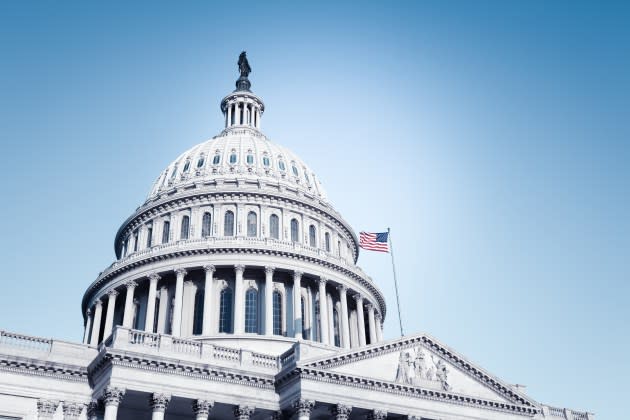House Lawmakers Propose Bill To Curb Unauthorized AI Deepfakes; SAG-AFTRA, Recording Industry Support Legislation
- Oops!Something went wrong.Please try again later.
- Oops!Something went wrong.Please try again later.
- Oops!Something went wrong.Please try again later.
- Oops!Something went wrong.Please try again later.

UPDATED, with MPA comment: House lawmakers introduced legislation to try to curb the unauthorized use of deepfakes and voice clones.
The legislation, the No AI Fraud Act, is sponsored by Rep. Maria Salazar (R-FL), Rep. Madeleine Dean (D-PA), Rep. Nathaniel Moran (R-TX), Rep. Joe Morelle (D-NY) and Rep. Rob Wittman (R-VA). The legislation would give individuals more control over the use of their identifying characteristics in digital replicas. It affirms that every person has a “property right in their own likeness and voice,” and do not expire upon a person’s death. The rights can be transferred to the heirs or designees for a period of 10 years after the individual’s death. It sets damages at $50,000 for each unauthorized violation by a personalized cloing service, or the actual damages suffered plus profits from the use. Damages are set at $5,000 per violation for unauthorized publication, performance, distribution or transmission of a digital voice replica or digital depiction, or the actual damages.
More from Deadline
The bill is a bit of a companion to draft Senate legislation unveiled in October. That proposal would prevent a person from producing or distributing an unauthorized AI-generated replica of an individual to perform in an audiovisual or sound recording without the consent of the individual being replicated.
Mitch Glazier, chairman and CEO of the Recording Industry Association of America, said in a statement that the House legislation “is a necessary step to protect individual rights, preserve and promote the creative arts and ensure the integrity and trustworthiness of generative AI.”
Also supporting the legislation is SAG-AFTRA. Its president, Fran Drescher, said in a statement, “Technology should exist to help humans, not replace them or rip them off. The minute we cross that line, we enter dystopia. SAG-AFTRA is committed to protecting individuals via all available means, and influencing this sort of much-needed public policy is one of the many ways we can ensure people and their intellectual property rights are protected from exploitation.”
The House bill includes a provision for a First Amendment defense, including whether the likeness is “necessary for and relevant to the primary expressive purpose of the work in which the use appears.” That includes whether the work is transformative, and whether it is “constitutionally protected commentary on a matter of public concern.” Those are factors that courts have considered in a “fair use” defense in the unauthorized use of copyrighted material.
The bill specially mentions incidents of the recent unauthorized use of digital likenesses. That included the use of AI technology to create the song Heart On My Sleeve, “emulating the voices of recording artists Drake and The Weeknd,” and another that featured Tom Hanks’ face in an advertisement for a dental plan.
The Motion Picture Association, which represents the major studios, had expressed some concerns over the Senate No Fakes Act last year. That also was reflected in a statement on Wednesday after the introduction of the House bill.
A spokesperson for the trade association said, “The MPA and its members share the concerns of actors and recording artists regarding unauthorized and harmful uses of AI-generated digital replicas of their likenesses or voices, including uses of such replicas in ways that could potentially replace performances by them and impact their ability to earn a living. To that end, the MPA’s members (via their collective-bargaining entity AMPTP) and SAG-AFTRA recently reached an agreement that includes what the union has justifiably characterized as ‘historic’ protections for performers, which include rights to informed consent and compensation for use of their digital replicas.”
“That said, any legislation must protect the ability of the MPA’s members and other creators to use digital replicas in contexts that are fully protected by the First Amendment. We look forward to working with the sponsors to ensure that this legislation establishes adequate protections against harmful uses of digital replicas without infringing on the First Amendment rights and creative freedoms upon which our industry depends.”
Also introduced on Wednesday was Tennessee legislation — the Ensuring Likeness Voice Image Security Act, or the ELVIS Act — to try to curb the use of unauthorized deepfakes and audio cloning in that state. He was joined by musicians and other artists at a press conference at a Nashville studio.
Later on Wednesday, a Senate Judiciary subcommittee plans to hold a hearing on AI and the future of journalism. The hearing comes amid a series of lawsuits, including from The New York Times, over AI companies’ use of copyrighted material in training models.
Best of Deadline
TV Cancellations Photo Gallery: Series Ending In 2024 & Beyond
Hollywood & Media Deaths In 2024: Photo Gallery & Obituaries
2024 Premiere Dates For New & Returning Series On Broadcast, Cable & Streaming
Sign up for Deadline's Newsletter. For the latest news, follow us on Facebook, Twitter, and Instagram.

